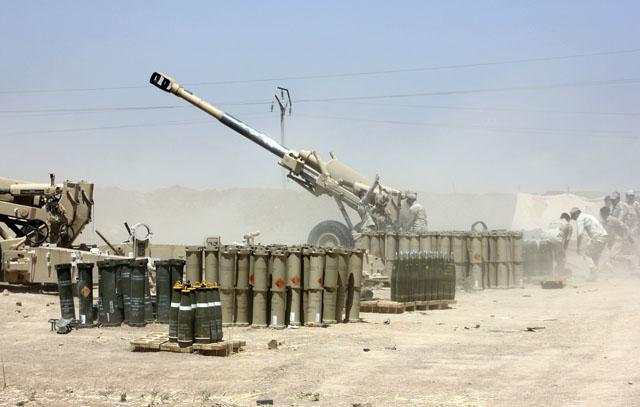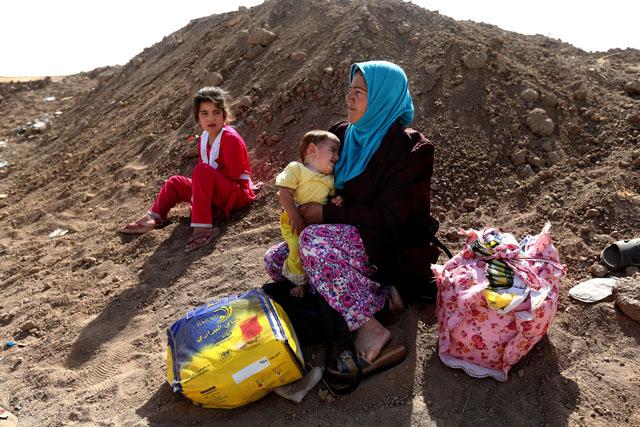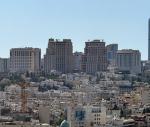You are here
Iraq insurgents take Saddam’s hometown in lightning advance
By Reuters - Jun 11,2014 - Last updated at Jun 11,2014

TIKRIT, Iraq — Sunni rebels from an Al Qaeda splinter group overran the Iraqi city of Tikrit on Wednesday and closed in on the biggest oil refinery in the country, making further gains in their rapid military advance against the Shiite-led government.
The threat to the Baiji refinery comes after militants from the Islamic State of Iraq and the Levant (ISIL) seized the northern city of Mosul, advancing their aim of creating a Sunni caliphate straddling the border between Iraq and Syria.
The fall of Mosul, Iraq’s second biggest city, is a blow to Prime Minister Nouri Al Maliki’s attempts to defeat the militants, who have seized territory in Iraq over the past year following the withdrawal of US forces.
About 500,000 Iraqis have fled Mosul, home to two million people, and the surrounding province, many seeking safety in the autonomous Kurdistan region. Insurgents are now in control of between 10 and 15 per cent of Iraqi territory, excluding Kurdistan.
Security sources said ISIL militants on Wednesday drove more than 60 vehicles into Tikrit, the hometown of former Iraqi president Saddam Hussein, occupying the provincial government headquarters and raising the black flag of ISIL.
“Our forces were caught by surprise, they never expected ISIL would use police and army Humvee vehicles, we mistook them for government forces and it was too late to stop them,” said a police captain who fled from Tikrit to Samarra.
“We are fighting devils and not ordinary people”.
Around 100 ISIL fighters held mass prayers in central Tikrit after taking control.
Foreign Minister Hoshiyar Zebari said Iraq’s leaders must unite to face a “mortal” threat. “There has to be a quick response to what has happened,” he said during a trip to Greece.
Zebari said Baghdad would work with forces from Kurdistan in the north to drive the fighters out of Mosul after they put Iraqi security forces to flight on Tuesday.
In a show of the militants’ reach, a car bombing in a crowded market in the town of Safwan, which sits on Iraq’s southernmost border with Kuwait, killed five people.
Conspiracy
Maliki described the fall of Mosul as a “conspiracy” and said those who had abandoned their posts would be punished. He also said Iraqis were volunteering in several provinces to join army brigades to fight ISIL.
In a statement on its Twitter account, ISIL said it had taken Mosul as part of a plan “to conquer the entire state and cleanse it from the apostates”, referring to the province of Nineveh of which the city is the capital.
Around 80 Turkish citizens seized in two separate incidents in Mosul were being held hostage by the militants, the foreign ministry in Ankara said.
Militants executed 10 soldiers and policemen on Wednesday near the town of Riyadh, 60km southwest of Kirkuk, after setting up a checkpoint on the road, police sources said.
ISIL, led by Abu Bakr Al Baghdadi, broke with Al Qaeda’s international leader, Osama Bin Laden’s former lieutenant Ayman Al Zawahiri, and has clashed with Al Qaeda fighters in Syria.
ISIL’s advances show that Iraq’s security forces — trained and equipped by Washington at a cost of nearly $25 billion and numbering more than a million — are outmatched against insurgents who once took on the might of the United States.
Overnight on Tuesday, ISIL militants moved on Baiji, home to Iraq’s largest refinery, which can process 300,000 barrels per day and supplies oil products to most of Iraq’s provinces and as well as Baghdad.
Security sources said the fighters drove into the town of Baiji in armed vehicles, torching the court house and police station before freeing prisoners.
The militants later withdrew into surrounding villages after tribal leaders persuaded them not to take over the energy installations in Baiji, local officials and residents said.
Dominant player
ISIL has become a dominant player in Iraq and Syria, where it has seized a string of cities over the past year, often fighting other Sunni groups.
The United States expressed concern about the deteriorating security situation in Iraq and pledged “any appropriate assistance” to help the Iraqi government.
In Washington, State Department spokeswoman Jen Psaki said the United States believed that the Baiji refinery remained under control of the Iraqi government.
ISIL control in the Sunni Anbar province as well as around Mosul would help the Islamist group consolidate its grip along the frontier with Syria, where it is fighting President Bashar Assad, an ally of Shiite Iran.
Members of Iraq’s Shiite majority have also been crossing the border to fight in Syria alongside Assad’s forces.
In Sadr City, a Shiite slum in Baghdad, men were stockpiling weapons in anticipation of a battle against ISIL.
“The army has proven to be a big failure. People have begun to depend on themselves because ISIL may enter Baghdad any minute,” said Muhannad Al Darraji from Sadr City.
At about the same time, a suicide bomber blew himself up in Sadr City, killing at least 18 people. A further 11 people were killed when a car bomb exploded near the northern Kadhimiya district, where there is a Shiite shrine.
Displacement
The governor of Mosul blamed Maliki for failing to act upon his warnings about the threat of ISIL.
“The entry of ISIL to Mosul was through the desert from Syria,” Atheel Al Nujaifi said. “There are camps in the desert and we have repeatedly asked the government to bomb these camps instead of luring ISIL into the cities to fight it.”
At a checkpoint on the road between Mosul and Erbil, residents who fled with little more than the clothes on their backs were stunned by the turn of events and did not know what to make of their city’s new occupants.
A 40-year-old man who fled the city with his family said: “We are frightened because we don’t know who they are. They call themselves revolutionaries. They told us not to be scared and that they came to liberate and free us from oppression.”
Critics say the failure of Maliki, a Shiite Muslim who has been in power for eight years, to address grievances among the once dominant Sunni minority led to a rise in Sunni militancy and pushed Sunni groups and tribes to rally behind ISIL.
Many Sunnis feel disenfranchised and some have made common cause with foreign Islamist radicals, first against the US troops that overthrew Saddam in 2003 and now against Shiite-led Iraqi forces.
Related Articles
The militants dismantling Iraq’s borders and threatening regional war are far from united — theirs is a marriage of convenience between ultra-hardline religious zealots and more pragmatic Sunni armed groups.
Iraqi government forces backed by helicopter gunships began an offensive on Saturday to retake the northern city of Tikrit from Sunni Islamist militants while party leaders pursued talks that could end Prime Minister Nouri Al Maliki’s divisive rule.
Iraqi forces launched an airborne assault on rebel-held Tikrit on Thursday with commandos flown into a stadium in helicopters, at least one of which crashed after taking fire from insurgents who have seized northern cities.
















